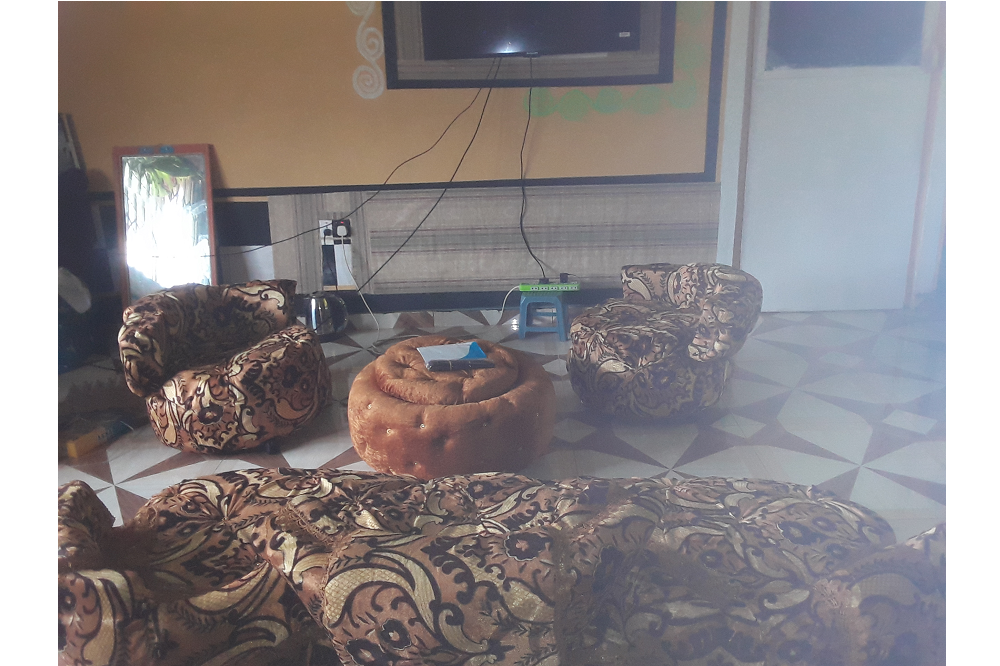Anita Afum, an Environmental Health Officer and Disease Control Analyst, is upcycling End-of-Life Tyres (ELTs) into sofas, centre tables, wall chairs and bucket centre tables.
It is a business model she said she learnt during her days as a trainee student at the Accra School of Hygiene in 2017.
“As an environmental health officer, I realised that we Ghanaians don’t know how to dispose of our tyre waste properly, but I later found out that there are several consumables that we can use these tyres for and make money from them too,” Afum said.
“Usually, people prefer to burn their tyres because they are non-biodegradable, and this activity contributes to climate change which negatively impacts our lives through the release of thick black smoke that stays in the air for long periods of time. It also impacts our environment with pollutants and harmful chemicals such as sulphur dioxide, xylenes, aldehydes, toluene, and styrene. This activity also releases carcinogenic chemicals like primarily polycyclic aromatic hydrocarbons and benzenethat have been found to cause human cancer.”
Afum founded her company, B4A Recycling Enterprise, in 2020. Her lightbulb moment began when she saw a young lady upcycling ELTs into the home and office furniture, and she was thrilled by such innovation; “I said to myself that I could also do the same being a creative person. So, I decided to learn on the job and created something presentable.
“I also attempted making a three-in-one seater sofa and came out with something beautiful. The advantage of this tyre furniture is that pests can’t stay inside, unlike regular woods, which shows how this would help us achieve in communities across Ghana.”
In recent years, Ghana has emerged as the country with the second dirtiest air in Africa, according to IQAir AirVisual’s 2020 World Air Quality Report. The open burning of residential wastes was one of the contributing factors to the country’s ambient air pollution.
Ghana’s very poor waste management system prompted President Nana Akufo-Addo to launch a dedicated Ministry for Sanitation and Water Resources in 2017.
In January last year, President Nana Addo announced, during the unveiling of new waste trucks, that the next phase of Ghana’s waste management is to convert trash to energy and also ensure the realisation of the clean Ghana agenda.
“We didn’t have any agency or dedicated waste management department which covered waste recycling and sanitation until President Nana Addo launched one in 2017,” Afum said. “I don’t think there is any need for indiscriminate disposal and burning of tyres if we have a proper management system in place.”
The Ashanti Regional National Disaster Management Organization (NADMO), a government agency responsible for the management of disasters in Ghana, had in 2019 issued a warning to residents around Kumasi airport to desist from burning cartyres.
Ghana generates not less than 2 million scrap tyres across the West African nation every year; the country’s vast tyre market is growing every year—it is now a multi-billion-dollar business.
The country is becoming a hub for the automobile industry due to an increase in the rate of urbanisation and the emergence of an increasing number of car owners. Ghana has a population of about 33 million and is projected to reach 52 million in 2050.
In Africa, there is so much potential for waste tyre recycling, given that its market is saturated with budget new tyres from East Asia due to the preference for low-priced Chinese tyres over expensive European and American brands. It is infamous for being the dumpster of the world’s used car tyres.
Africa produces approximately 250 million scrap tyres which can be recycled for Tire-Derived Fuel (TDF). It is used in asphalt, non-slip surfaces, athletic surfaces, fields, and more. However, the percentage recycled is relatively low.
Afum says her work breaks away from mere furniture making from ELTs into an innovative tyre waste management process which ensures the production of durable furniture for her customers.
“If someone buys my sofa, it will take a long time before it wears out or becomes waste unless you choose to destroy it yourself.
Tyres are nonbiodegradable items; instead of burning them as a way of managing waste, give them to people who can transform them or use them for something innovative that can be sold as a usable item in the house, hotels, schools, churches, or anywhere you choose to use them.”
She said; “the sofa, for instance, can last for about 20 years, and the tyres will remain stable. It can be recycled again and used for something else. So, while saving the environment, you are also saving production costs.”
B4A Recycling Enterprise recycles bicycle and light pick-up tyres, sourced from vulcanisers, into furniture.
Afum says the price range for her products is between USD 100 to USD 1,000. “I source most of my tyres from vulcanisers at lower prices. I buy them cheaply and wash them before use.
“But the challenges I have to deal with are the high costs of leather materials and the tedious nature of the work before it requires carpentry skill. So, I need to have a mixture of men and women on my team to produce optimally and efficiently.” She said.
In the future, she is looking to expand her business into an industrialised venture where lots of women can train and set up their own tyre recycling businesses, “I am also hoping to open up shops in every region so that I can have a large customer base and sell my products, too.”


















